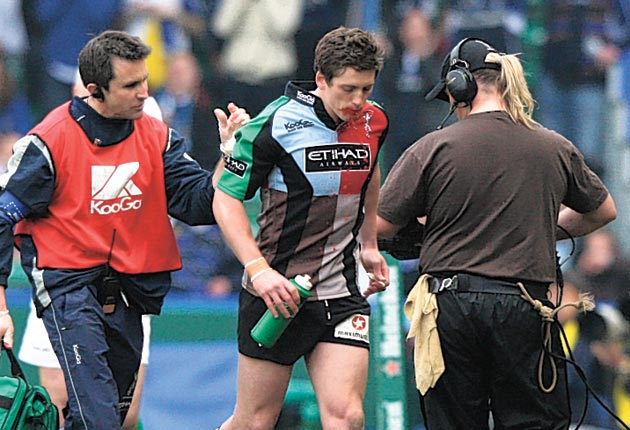Your support helps us to tell the story
From reproductive rights to climate change to Big Tech, The Independent is on the ground when the story is developing. Whether it's investigating the financials of Elon Musk's pro-Trump PAC or producing our latest documentary, 'The A Word', which shines a light on the American women fighting for reproductive rights, we know how important it is to parse out the facts from the messaging.
At such a critical moment in US history, we need reporters on the ground. Your donation allows us to keep sending journalists to speak to both sides of the story.
The Independent is trusted by Americans across the entire political spectrum. And unlike many other quality news outlets, we choose not to lock Americans out of our reporting and analysis with paywalls. We believe quality journalism should be available to everyone, paid for by those who can afford it.
Your support makes all the difference.Former Harlequins physiotherapist Steph Brennan won a High Court battle today over the decision to strike him off for his part in the "Bloodgate" rugby controversy.
Lawyers for the top physio accused the Health Professions Council (HPC) of unlawfully imposing a "one strike and you are out for good" approach to his case.
They argued that his conduct had merited a sanction, but not one of such "gross severity".
Today Mr Justice Ouseley, sitting at London's High Court, quashed the decision against him and ordered the HPC's conduct and competence committee to reconsider the case.
Brennan had been due to start work with the RFU as an England physio until his role in the systematic use of fake blood capsules during matches was exposed.
He helped fabricate a blood injury to winger Tom Williams during Harlequins' Heineken Cup quarter-final defeat by Leinster at Twickenham Stoop in April 2009.
He admitted five instances of faking blood injuries, the first of which happened during Harlequins' 2005/06 season.
On three occasions this was for player welfare, while Brennan said the fourth was to get an unnamed player in a key position on to the pitch following the sin-binning of a team-mate.
Stephen Brassington, for the HPC, argued that the striking-off order was not open to legal challenge.
He rejected accusations that panel members had failed to give adequate reasons and explain in their decision how they had dealt with Brennan's expressions of sorrow and remorse.
Mr Brassington said: "His expressions of remorse and sorrow simply were too little too late."
Brennan's misconduct "was so egregious and damaging to the reputation of his profession that the only appropriate way to deal with it was striking-off".
Today Mr Justice Ouseley ruled that the reasoning of the HPC's disciplinary committee on its decision to strike off was "legally inadequate".
He said the same committee must now reconsider what sanction to impose in the light of his ruling.
The judge said Brennan's dishonesty had occurred in unusual circumstances.
Patients were not harmed and "what was done was done at the behest of a dishonest coach on behalf of their joint employer".
Although Brennan's actions deserved punishment, that was a matter for rugby's regulatory body, and it was "not the task of the committee when deciding on sanction".
Given that no patient was at risk, the committee's interest in Brennan's case was in deterring similar conduct, protecting the reputation of the profession, or ensuring confidence in the regulatory process, "or all three".
It was concerned with "the relationship between cheating in sport and lying about it" and Brennan's abuse of his position as a physiotherapist to enable cheating to take place.
"This relationship required careful attention if sanction was not to become a further punishment, and the committee did not address this issue in its expressed reasoning," said the judge.
Quashing the striking-off decision, he declared: "The reasoning is legally inadequate, failing to deal with the issues properly raised for its consideration by Mr Brennan."
Paul Harris, appearing for the physio, asked the judge to order a differently constituted panel to reconsider the question of sanction "to avoid the appearance of bias".
Mr Harris emphasised that Brennan was anxious to call fresh evidence to put an end to any lingering doubt "about the genuineness of his contrition and remorse" and it would appear fairer if it was head by a fresh panel.
Mr Harris stressed he was not saying there had been any actual bias.
But the judge said he could see no disadvantage "in terms of perceived unfairness" in referring the matter back to the same panel, while the advantage was that the panel members had already heard all the evidence.
He ordered the HPC to pay Brennan's legal costs of more than £12,000.

Join our commenting forum
Join thought-provoking conversations, follow other Independent readers and see their replies
0Comments